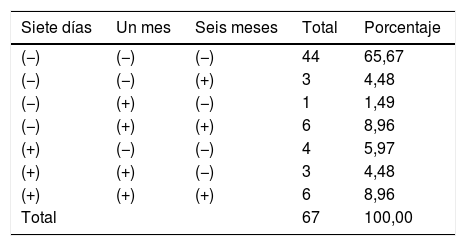Helicobacter pylori constituye un problema de salud mundial principalmente por el elevado porcentaje de infección y la ineficacia en los tratamientos. Para prevenir la infección resulta clave conocer la edad de adquisición.
PacientesParticiparon 67 madres y sus respectivos hijos. Para evaluar la presencia de H. pylori, las deposiciones de la madre y de su hijo fueron analizadas mediante el test HpSA.
ResultadosEl 71,6% (48/67) de las embarazadas a término fueron H. pylori positivas. En los recién nacidos, el 8,96% (6/67) de ellos presentaron colonización/infección persistente para H. pylori. Durante el primer mes de vida se observó una prevalencia e incidencia de infección del 23,9 y 13%, respectivamente.
ConclusiónLos resultados, en conjunto, sugieren que durante el primer mes de vida existe un alto riesgo de infección por H. pylori, pudiendo ser esta incluso de tipo persistente.
Mainly due to the high percentage of infection and the ineffectiveness of treatments, Helicobacter pylori is a global health problem. Knowing the age at acquisition is key to preventing the infection.
PatientsSixty-seven mothers and their respective children participated. To evaluate the presence of H. pylori, the faeces of the mother and her child were analysed using the HpSA antigen test.
Results71.6% (48/67) of pregnant mothers were positive for H. pylori at the term of their pregnancy. In newborns, 8.96% (6/67) of them showed H. pylori colonisation/persistent infection. During the first month of life, a prevalence and incidence of infection of 23.9% and 13%, respectively, was observed.
ConclusionOverall, the results suggest that there is a high risk of H. pylori infection during the first month of life, even of the persistent type.
Artículo
Socio de la Sociedad Española de Enfermedades Infecciosas y Microbiología Clínica

Para acceder a la revista
Es necesario que lo haga desde la zona privada de la web de la SEIMC, clique aquí
Comprando el artículo el PDF del mismo podrá ser descargado
Precio 19,34 €
Comprar ahora









